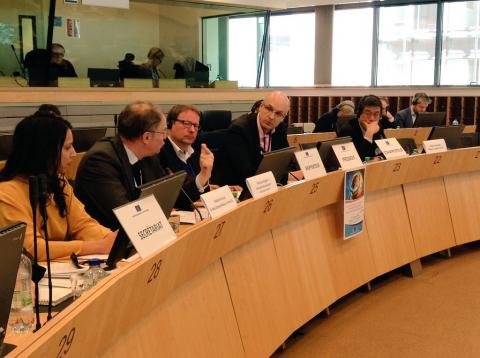European Economic
and Social Committee
L'UE devrait disposer d'un meilleur mécanisme de sélection des investissements étrangers directs pour garantir que la sécurité et l'ordre public ne soient pas menacés
La version FR bientôt disponible
Over the last 10 years there has been an increase in investment from third countries in the EU, with most of it coming from the USA, Canada and Switzerland, followed by Brazil, China and Russia.
Civil society organisations, think tanks, foreign government representatives and EU institutions took part in the public hearing on screening of foreign direct investment in the EU, held by the EESC on 27 February in Brussels. All the participants shared the view that foreign direct investment was a major source of growth, jobs and innovation but that it could also carry risks to national security and public order. Christian Bäumler, EESC rapporteur on the topic, pointed out that less than half of the Member States currently had foreign investment screening mechanisms and that the investment screening cooperation mechanism proposed by the European Commission was a step in the right direction. However, he also emphasised that there were many questions which needed to be addressed, such as the division of competencies between the Commission and the Member States and the need to extend investment screening to sensitive areas of key infrastructure and technology. The co-rapporteur, Gintaras Morkis, stressed that the Commission had not carried out an exhaustive impact assessment on investment flows when it prepared its proposal for a regulation establishing a framework for screening of foreign direct investment, which made it harder to assess the impact of a screening mechanism. He also pointed out that under the proposed regulation Member States were not required to put in place their own investment screening mechanisms, which could lead to difficulties in achieving the goals of the proposal.
Marta Busz from the European Commission provided more details about the Commission's proposal for a regulation, which was a response to the current complex investment landscape. Both the Member States and the Commission had concerns that some foreign investors, notably state-owned ones, were interested in acquiring European businesses that possessed key technologies, and in investing in strategic industrial sectors, infrastructure and other assets important for the security of the Member States and the EU as a whole. The Commission had identified 12 Member States which had their own investment screening mechanisms, but noted that there was no exchange of information between them. The main aim of the Commission's proposal was to enhance cooperation on FDI screening between the Commission and the Member States and to increase legal certainty and transparency. Under the new proposal the Commission could also issue a non-binding opinion if a foreign direct investment in a Member State might affect the security or public order of another Member State, or of programmes of Union interest. Ms Busz emphasised that ultimately the Member States had the final decision-making power on foreign direct investment.
Some of the concerns voiced at the hearing related to the possible administrative burden that the proposed regulation could create for investors, and also the need to include the social partners in the coordination group on foreign direct investment which would be established under the new regulation. The participants in the hearing also had the chance to find out more about the FDI screening mechanisms that already exist in France, the USA and Japan.
The outcomes of the public hearing will feed into the EESC's opinion on this topic, which is expected to be presented at the EESC's plenary session in April 2018.
